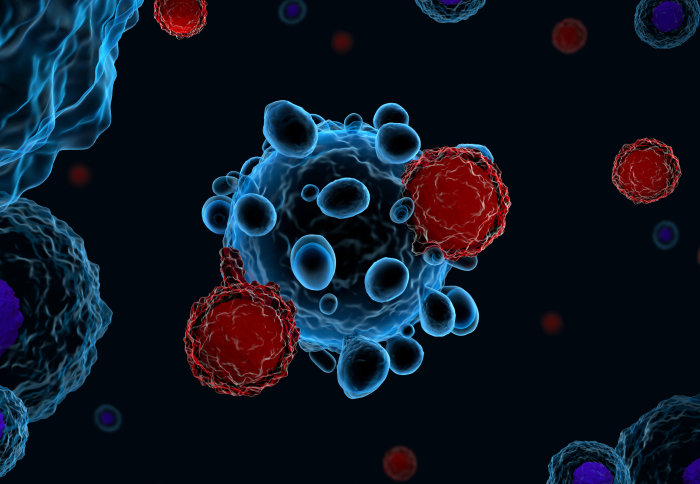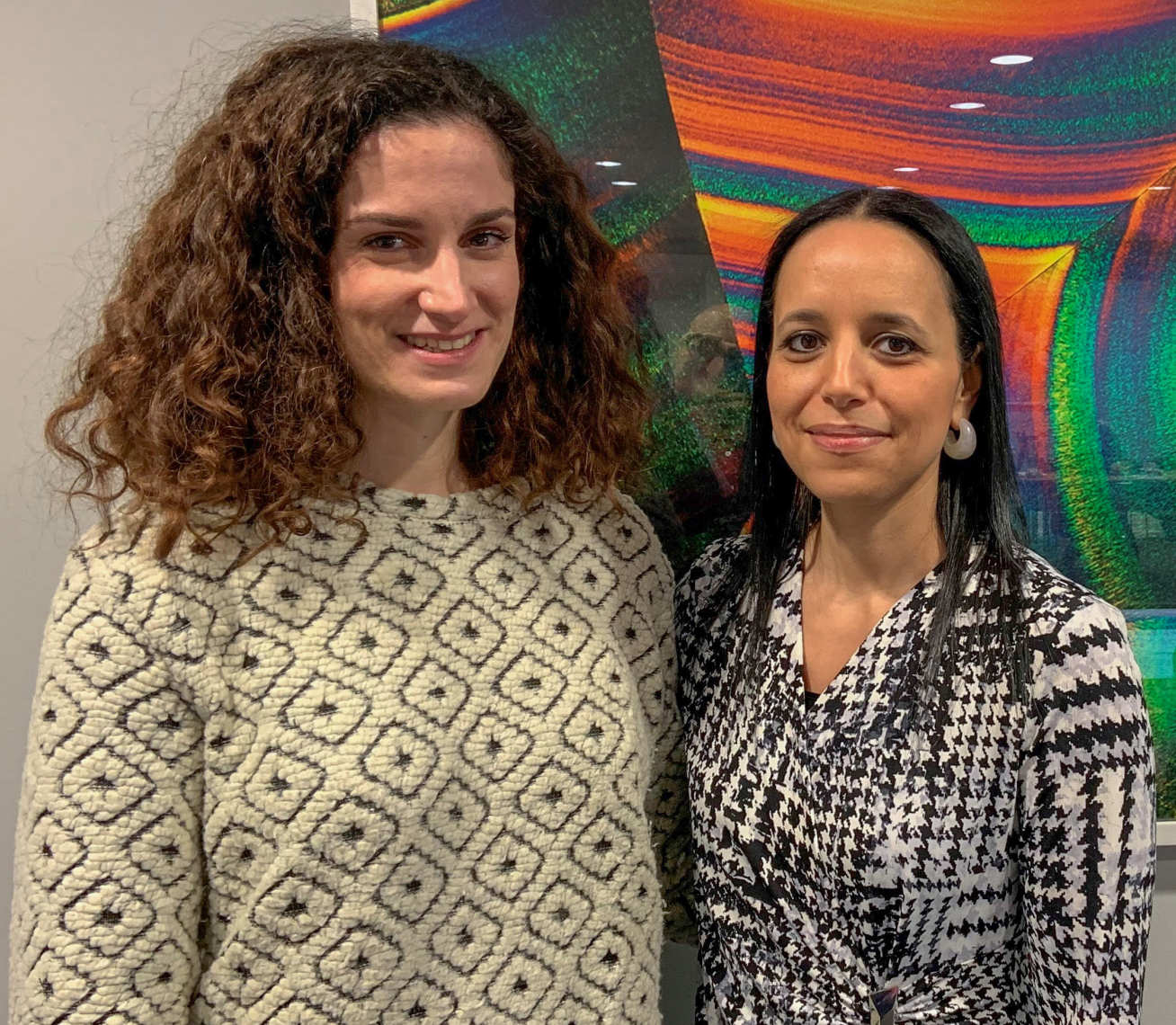Engineering solutions to improve access to autologous CAR-T cell therapy
by Sara West

Immune system T cells attacking cancer cells
Research suggests that changes to the manufacture and supply of CAR-T cell therapy could reduce costs and provide better patient access to treatment.
In a paper published in Cancer Gene Therapy Nature, lead author Dr Maria Papathanasiou and colleagues from the Future Targeted Healthcare Manufacturing Hub present solutions to manufacturing and distribution challenges associated with CAR-T cell therapy, which they predict will reduce costs and facilitate its scale-up to meet increased demand.
Autologous CAR-T cell therapy is a relatively new treatment which harnesses a patient’s own immune cells to target and attack cancer. It has shown promising results in cases where individuals have relapsed following other types of treatment.
However, the two marketed therapies are only available at a relatively high price. This is largely due to the sensitive nature of the product that requires cold-chain distribution, advanced manufacturing and one-to-one business models.
Dr Papathanasiou and colleagues have mapped out the current procedures for producing the technology and suggest solutions to reduce potential bottlenecks in the process, particularly as patient numbers increase.
Pioneering cancer treatment
Autologous CAR-T cell therapy has been described as a ‘novel’ and ‘pioneering’ cancer treatment. Autologous therapy, sometimes known as 'vein-to-vein', involves using an individual's own cells or tissues to treat them. In this instance, cells are removed from the patient's bloodstream, reengineered, then administered back into their body.
The treatment utilises the function of T cells, the type of cell responsible for responding to infections or disease in the body. Once harvested from a patient’s blood they are taken to a lab and modified with a Chimeric Antigen Receptor (CAR). This receptor boosts the body’s natural immune response by preparing the T cells to identify and attack a specific protein on cancer cells.
Once modified, the newly created CAR-T cells are cultured in a lab, creating an army of cancer-fighting soldiers, then transported back to the patient and into their blood.
It’s a unique therapy with the potential to mark a significant turning point in personalised therapies. It utilises an existing, efficient system - the immune system - using readily available resources - a patient's T cells - for a specific task. The therapy has so far shown promising results in treating certain types of cancer which have been resistant to other treatments such as chemotherapy.
From A to B and back again
While this innovative treatment offers hope for terminal stage cancer patients, there are inherent challenges in the manufacturing and supply chain which affect the cost and length of time needed to produce just one course. As patient numbers are predicted to increase over the next decade, it is imperative that these issues are addressed to enable the scale-up of production.
"The manufacturing process is highly complex because it involves several steps across different sites which all require precise coordination." Dr Maria Papathanasiou Department of Chemical Engineering, Imperial College London
The three stages of the 'vein-to-vein' process are cell collection, therapy manufacturing and therapy administration. Cells are collected from a patient a clinical facility, transported to a manufacturing site to be processed and quality controlled, then returned to the clinical facility to be administered to the patient.
Lead author Dr Maria Papathanasiou explained: “The manufacturing process is highly complex because it involves several steps across different sites which require precise coordination. Any error in timing, transportation methods, or storage can risk damaging the cells and if this happens, the entire process must start again from the beginning”.
Each of the steps requires careful management and precise sample tracking. Clinical sites, for example, must have adequate preservation technologies to either freeze or cryopreserve patient samples, while trained personnel must be present during transportation to avoid mishandling. Returning the sample to the patient requires timing the coincide with preconditioning, which takes approximately one week.
In addition, manufacturers need to provide adequate storage facilities and accurately estimate demand in order to manage the raw materials required for manufacturing.
Designing a dynamic supply chain
As it exists, the manufacturing and supply chain can only manage a relatively low volume of patients. In the UK there is currently a maximum of 1000 patients receiving this therapy across all active trials, in no more than 10 specialist centres. Patient numbers are predicted to rise to as many as 40,000 per year in the UK by 2031 which, the research team says, will only be possible with an agile supply chain.

Dr Papathanasiou said: “Every aspect of this process needs to be carefully planned for it to operate on a larger scale, from storage facilities in clinical and manufacturing settings to the use of cloud-based platforms for tracking samples across their journey.”
One of the key recommendations from the research team is the introduction of intermediate sites between cell collection and processing, which they predict will reduce bottlenecks in the system. Currently, samples cannot be stored in medical facilities so they must be delivered to the manufacturing facility almost immediately after collection and then processed as soon as possible. Sites may struggle to manage this as demand increases.
Furthermore, the team recommends that manufacturers assume responsibility for the freezing and cryopreservation of samples, another element currently managed by medical facilities, as this stage is considered by experts to be part of the manufacturing process.
Although these actions will come with increased costs to manufacturers, they would provide them with greater autonomy over scheduling logistics and shipping, independent of hospital capacity. Greater control over freezing and thawing processes would also likely result in less risk of damage to the samples.
The future of medicine
Personalised therapies are increasingly seen at the future of medicine and medical technologies, perhaps none more so than CART-T cell therapy. It’s success in clinical trials for some of the most difficult-to-treat cancers marks an important development in cancer research.
The goal of the medical community is to extend this treatment to a higher number of patients, and in order to do this, pharmaceutical companies must adapt their one-size-fits-all supply chain model to one which can serve patients on-demand.
This paper demonstrates the value of a systems approach in making this possible, using advanced mathematical modelling to mitigate risks and smooth transitions. The team is currently working on the development of an optimisation model to allow information-based decision-making in the supply chain of personalised medicine.
-
‘Autologous CAR T-cell therapies supply chain: challenges and opportunities?’ by Maria Papathanasiou et al. is published in Cancer Gene Therapy Nature.
Future Targeted Healthcare Manufacturing Hub
UCL Biochemical Engineering has an outstanding record and is a world leader in bioprocess research across a range of sectors. UCL's Future Targeted Healthcare Manufacturing Hub engages leading academics across the UK as Spokes. This national asset is valued in excess of £20m over 7 years (2017-2024).
University partners include Imperial College London, University of Nottingham, Warwick Business School, Univerisity of Manchester, Cambridge University, and Loughborough University.
The Hub will address the manufacturing, regulatory challenges to ensure that new medicines can be developed quickly and a cost affordable to society. The research will span stratified protein to particular patient groups through to truly personalised cell-based medicines.
The Hub is unique in the biomanufacturing space and is being supported by a large number of the leading manufacturers and suppliers in the biotherapeutics and non-governmental associations.
For more information visit the Future Targeted Healthcare Manufacturing Hub website.
Cover image copyright: Meletios Verras/Shutterstock.com
Image of Dr Maria Papathanasiou and Professor Suzanne Farid courtesy of Kim Morgan, UCL.
Article text (excluding photos or graphics) © Imperial College London.
Photos and graphics subject to third party copyright used with permission or © Imperial College London.
Reporter
Sara West
Communications Division